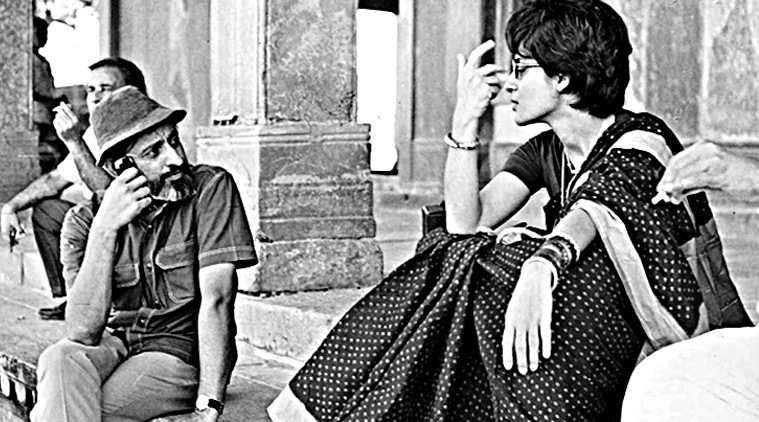 MS Sathyu and Shama Zaidi
MS Sathyu and Shama Zaidi
It might have been years after the Partition, but when director MS Sathyu’s Garam Hawa hit cinema halls in 1973, it prised open the struggles of those trying to come to terms with their lives in post-Partition India. The moving saga that dealt with the plight of the Muslims who decided to stay in India and not migrate, happened only because iconic playwright and screenwriter Rajinder Singh Bedi persuaded theatre person, writer, costume designer and Sathyu’s wife Shama Zaidi to write their story. “I was doing the stage version of his novel Ek Chadar Maili Si then. After he asked me several times, I spoke to Ismat aapa (Chughtai) and requested her to write a story. She borrowed from numerous stories, took ideas from her mother’s life, who stayed in Aligarh in a Hindu neighbour’s house but did not leave India, and came up with Vahaan. I wrote a long script, which was then fixed by Kaifi Azmi,” says Zaidi. The title of the film came from a phrase in Azmi’s famous poem Makan — Aaj ki raat bahut garm hawa chalti hai, the poem read.
Zaidi, 78, was in Delhi to speak at a tribute session titled “Rajinder Singh Bedi: Insaani Rishton Ka Raazdaan”. Organised yesterday, on the final of the Urdu Festival Jashn-e-Rekhta, the session discussed Bedi’s repertoire of Urdu fiction writing and how it resonated through the subcontinent.
“I haven’t read many who have been able to match his observation and the way he looked at human relationships,” says Zaidi.
She recalls the harrowing times faced by the couple (Zaidi and Sathyu) after the 1973 film was complete. While the Censor Board banned its public screening for almost a year, Zaidi notes that Bal Thackeray insisted on seeing it before the premiere. “At that time, Mrs Gandhi held it up for one year. I see bans on films even now. The situation hasn’t changed,” says Zaidi. She adds that what is happening in India now is similar to the situation that Zia-ul-Haq created in Pakistan. “Zia was the first person in his community — a vegetable selling caste considered low in Punjabi Muslims — to go to St Stephen’s College in Delhi University and do well, so he wanted to prove that he was a better Muslim than other Muslims. Mr Modi is a Sanskritised OBC, who is proving to you that he is a better Hindu than other Hindus. The situation is the same,” says Zaidi.
Born into an illustrious family, with theatre person Qudsia Begum, who set up the famous Hindustani Theatre in Delhi, as her mother, and politician and educationalist Bashir Hussain Zaidi as her father, Shama grew up with strong left-wing ideas because of her parents’ association with the progressive communist movement. Theatre person Habib Tanvir was a regular at their house and interactions with him were instrumental in shaping her ideology. “I had a massive crush on him. I was just 15 and was awed. He, however, was quite amused by the idea,” says Zaidi. After graduating from Miranda House in Delhi University and attaining a diploma in stage design from Slade School of Art, she worked closely with Indian People’s Theatre Association (IPTA), before writing Garam Hawa.
She later did art direction for Shyam Benegal’s Manthan and Bhumika and Muzaffar Ali’s Umrao Jaan, wrote scripts for Aarohan and Mandi, and designed costumes for Satyajit Ray’s Shatranj Ke Khiladi, among others. She finds the current crop of Hindi filmmakers rather disappointing. “There are two kinds of Hindi films. Hindi mein, aur Hindi ki. There are many from the latter category and very few from the former. The problem is that the link between culture and films has broken. This link comes from literature and the lifestyle of people, which I just don’t see,” says Zaidi, who is also keen to direct a film. “I wrote one. The script was passed by the National Film Development Corporation of India (NFDC) and I showed it to Shashi Kapoor. He threw it on my face and said that it was an anti-male film,” says Zaidi, adding that the script was based on an Ismat Chughtai story, about a man whose mistress and wife become friends and gang up against him. She canned it because the NFDC wanted a star to feature in the film.
She is also planning a film adaptation of the late Shrilal Shukla’s Raag Darbari, a poignant novel that talks about the powerlessness of the intelligentsia due to the fraudulent network that exists between criminals, businessmen and politicians. “I had paid him (Shrilal Shukla) an advance. We discussed all the bits he had left out in the book, including the sexual subtext of the protagonist, but things aren’t moving as of now. Let’s see if it eventually works out,” says Zaidi.